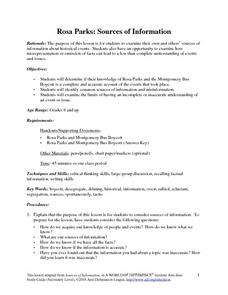American Institute of Physics
The Black Scientific Renaissance of the 1970s-90s: African American Scientists at Bell Laboratories
A two-part lesson plan asks young scientists to research the contributions of African American scientists at Bell Laboratories. After presenting their findings, class members watch two demonstrations that introduce them to total internal...
US House of Representatives
A Picture is Worth a Thousand Words
Groups select a photograph from one of the four eras of African Americans in Congress and develop a five-minute presentation that provides background information about the image as well as its historical significance. The class compares...
PBS
Out of the Shadows | Black America Since MLK: And Still I Rise
Two powerful video clips launch a study of race relations in the United States after the Selma, Alabama riots, the passage of the Votings Rights Act, and the riots in Watts, California.
Center for History Education
Speaking Up and Speaking Out: Exploring the Lives of Black Women During the 19th Century
Young historians investigate the often-hidden history of free and enslaved African American women before the Civil War. Using a collection of primary and secondary sources, including speeches, diaries, and poems, they evaluate the often...
Scholastic
Ruby Bridges: A Simple Act of Courage, Grades K-2
A civil rights movement lesson designed specifically with the Common Core State Standards in mind, young learners are introduced to the story of Ruby Bridges as the first African American child to attend an all-white elementary school....
Scholastic
Ruby Bridges: A Simple Act of Courage, Grades 3-5
Through character trait graphic organizers, a vocabulary sorting activity, class discussion, and a civil rights movement slide show, your young historians will be introduced to the amazing story of Ruby Bridges and her experiences as the...
American Institute of Physics
African American Inventors in History
A two-part lesson plan introduces young historians to the work of famous African American inventors. Groups first research and develop a presentation of an inventor that includes biographical information and information about one of...
North Carolina Consortium for Middle East Studies
Missing Pieces of the Puzzle: African Americans in Revolutionary Times
What's missing from most studies of the American Revolutionary War is information about the role African Americans played in the conflict. To correct this oversight, middle schoolers research groups like the Black Loyalists and Black...
Anti-Defamation League
Women's Suffrage, Racism, and Intersectionality
The Nineteenth Amendment granted women the right to vote—as long as they were white. High schoolers read articles and essays about racism in the suffrage movement and consider how intersectionality played a role in the movement. Scholars...
Crafting Freedom
F.E.W. Harper: Uplifted from the Shadows
What is stereotyping, and how do we handle stereotyping in our daily interactions? Your young historians will not only have the opportunity to learn about the first African American woman to publish a short story–Frances Ellen...
Crafting Freedom
George Moses Horton: Slavery from a Poet's Perspective
After reading about the life of George Moses Horton, the first slave to publish anti-slavery poetry, learners will recall his major accomplishments, provide a summary of the obstacles he faced, and identify common aspects of the...
Atlanta History Center
Civil Disobedience and the Atlanta Student Movement
What tactics are used in civil disobedience? Learners study the conditions in Alabama that led to the establishment of the Atlanta Student Movement, as well as consider the nature and effectiveness of civil disobedience.
Stanford University
Ruby Bridges
A two-part lesson features Civil Rights hero, Ruby Bridges. Part one focuses on the heroic actions of Ruby Bridges then challenges scholars to complete a Venn diagram in order to compare themselves to her. Part two begins with a...
Atlanta History Center
What if YOU Lived During Jim Crow?
Young historians envision what life was like for African Americans living in the Jim Crow South through hands-on, experiential activities.
Crafting Freedom
The Self-Empowerment of Harriet Jacobs
In a hands-on learning activity, pupils read about and recreate the experience of Harriet Jacobs, author of one of the most famous slave narratives of all time in which she describes her years of hiding from her master in a confined...
Scholastic
Lesson 3: Essay Organizer
A three-minute exercise warms-up scholars' writing abilities in order to follow a writing process that ends in an essay. The essay's topic is a barrier and the values used to break it. Four steps include choosing a topic, jotting-down a...
Carolina K-12
African American Troops in the Civil War
Middle schoolers explore the history of the African-American troops that served during the American Civil War. After reading primary source documents that detail the controversies about permitting freemen and former slaves to serve,...
Learning for Justice
Maya Angelou
Maya Angelou's poem, "Still I Rise", offers young scholars an opportunity to consider how poets use literary devices to create powerful messages. After a close reading and discussion of the poem, class members reflect on how they can...
National Woman's History Museum
African American Activists
Ida B. Wells, Rosa Parks, and Fannie Lour Hammer are three African American activists who stood up for change. Though living in different time periods, all three women sought justice and equality. Class members examine primary source...
John F. Kennedy Center
Musical Harlem: How Is Jazz Music Reflective of the Harlem Renaissance?
Bring jazz music and the Harlem Renaissance to light with a lesson that challenges scholars to research and create. Pupils delve deep into information materials to identify jazz terminology, compare types of jazz and jazz musicians,...
Smithsonian Institution
Jamaican Song, Dance, and Play: Experiences with Jamaican Musical Traditions
Young musicians experience song, dance, and play of the Jamaican culture. Scholars listen for and recreate beats, they play tunes, make up original dances, and play a game that challenges pupils to pass stones to a specific beat.
Smithsonian Institution
Singing for Justice: Following the Musical Journey of “This Little Light of Mine”
Scholars go on a musical journey to discover the origin, importance, and evolution of the song, "This Little Light of Mine". Class members boost their voice talents and clap to the beat while learning the lyrics in both English and Zulu....
Anti-Defamation League
Rosa Parks: Sources of Information
Young scholars show what they know about Rosa Parks and the incident on one of the buses in Montgomery, Alabama. Groups discuss and identify where they receive most of their information. They examine the importance of having a complete...
Carolina K-12
African Americans and the Vietnam War
No need to look any further. This resource has everything for a solid exploration of the role of African Americans in the Vietnam War. Class members read primary sources, including a Martin Luther King speech, political cartoons of the...
Other popular searches
- Black History Month Projects
- Black History Month Math
- Black History Month Art
- Black History Month Rap
- Black History Month Programs
- Black History Month Music
- Black History Month Activities
- Black History Month Skits
- Black History Month Poems
- Black History Month Lessons
- Black History Month Poetry

























